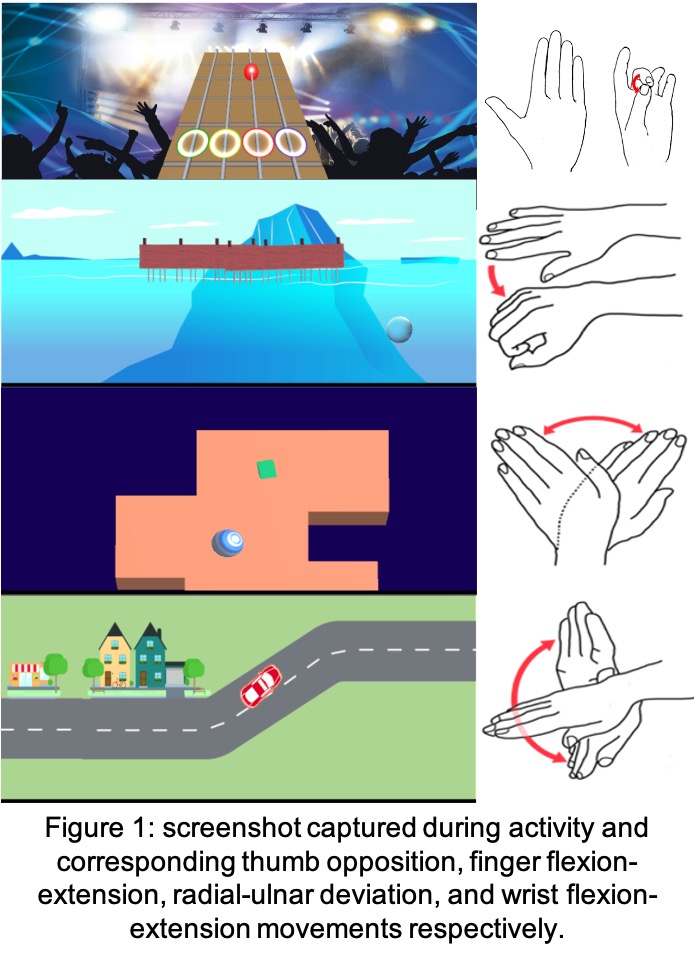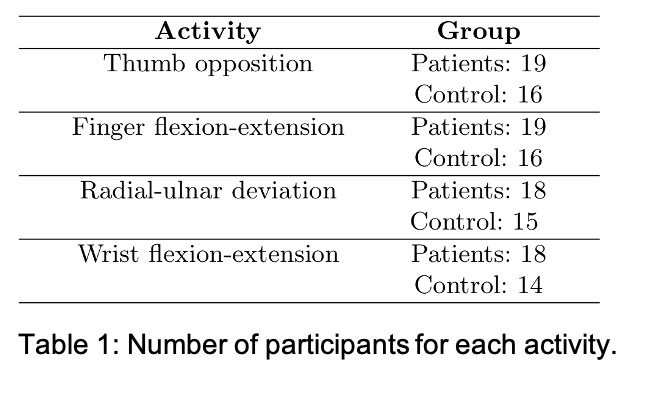Session Information
Session Type: Poster Session B
Session Time: 9:00AM-11:00AM
Background/Purpose: The excessive production and accumulation of collagen in systemic sclerosis (SSc) leads to the gradual loss of mobility which affects the quality of life of patients [Parisi, S., et al. 2017]. Hand disabilities in SSc are frequent and contribute to the manifestation of several diseases e.g. reduced mobility, dexterity, and grip strength. Recognizing such symptoms is essential, however no definitive medical treatment is yet available [Young, A., et al. 2016]. The rehabilitation is crucial, and it involves a multidisciplinary team, and aims at improving hand mobility, functionality, and strength [Parisi, S., et al. 2017].
Repetitive movements, typically involved in rehabilitative exercises, can be executed as videogame goal to keep the patient’s engagement high. Several studies which make use of videogames can be found in literature, however, very few, and with a limited number of games, refer to the SSc [Eusterwiemann, E., et al. 2019].
The aim of this study was to compare the use of videogames in the assessment phase, in order to address the coherence between the outcome from the digital support, and the standard ones.
Methods: ReMoVES is a telerehabilitation system which provides a support for recovery through videogames, carried out via Leap Motion [Morando, M., et al. 2018].
Four games for hand and wrist movements stimulation were analyzed. They enable the practicing of movements that are typically impaired for SSc patients, i.e. thumb opposition, finger flexion-extension, radial-ulnar deviation, and wrist flexion-extension (Figure 1).
The first purpose was to distinguish patients and control group, based on the ReMoVES feedback. For each activity, the available population is specified in Table 1. The Kruskal-Wallis test was used to this purpose. Then, the correlation between the outcomes deriving from ReMoVES and the score from items 3,6, and 8 from the HAMIS test [Del Rosso, A., et al. 2010], was studied on a population of 12 patients with SSc.
Results: The resulting p-values from the test (p = 0.0001 for thumb opposition, p = 0.0019 for finger flexion-extension, p = 0.0028 for radial-ulnar deviation, and p = 0.0011 for wrist flexion-extension) confirmed that the features from ReMoVES are significantly different between patients and control group. Also, the correlation coefficient considering the ReMoVES outcomes and the HAMIS questions proved the coherence between the standard and digital assessment. Such values are: 0.756 for thumb opposition and item 3, 0.767 for finger flexion-extension and item 6, 0.764 for wrist flexion-extension and item 8, 0.788 for radial-ulnar deviation and item 3, and 0.754 for wrist flexion-extension and item 6
Conclusion: Physicians involved in the treatment of SSc need to consider rehabilitation, and skilled physiotherapists and occupational therapists also play a crucial role in evaluating and treating SSc patients. Movements that are typically impaired for SSc patients are stimulated by ReMoVES videogames, which help to entice patients in practicing the rehabilitation activity. The feedback from ReMoVES on the population who participated to the trial is reliable and coherent with the standard outcomes
To cite this abstract in AMA style:
Doveri M, Trombini M, Ferraro F, Galli R, Bargeri A, Rando S, Dellepiane S, Bianchi G. Towards Systemic Sclerosis Rehabilitation via Videogames [abstract]. Arthritis Rheumatol. 2020; 72 (suppl 10). https://acrabstracts.org/abstract/towards-systemic-sclerosis-rehabilitation-via-videogames/. Accessed .« Back to ACR Convergence 2020
ACR Meeting Abstracts - https://acrabstracts.org/abstract/towards-systemic-sclerosis-rehabilitation-via-videogames/


